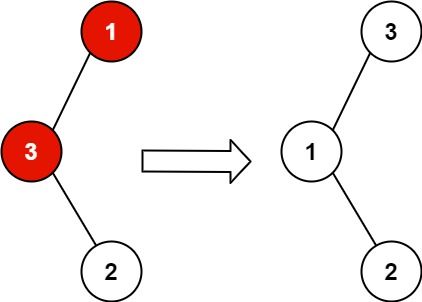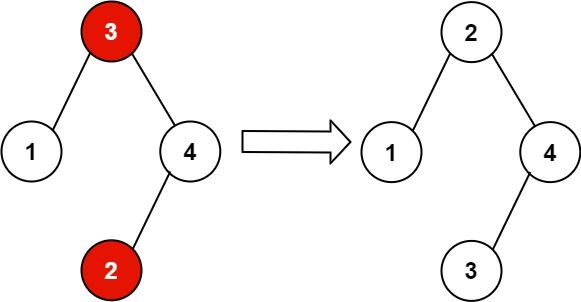二叉搜索树
二叉树
树
深度优先搜索
题目描述
给你二叉搜索树的根节点 root ,该树中的 恰好 两个节点的值被错误地交换。请在不改变其结构的情况下,恢复这棵树 。
示例 1:
输入: root = [1,3,null,null,2]
输出: [3,1,null,null,2]
解释: 3 不能是 1 的左孩子,因为 3 > 1 。交换 1 和 3 使二叉搜索树有效。
示例 2:
输入: root = [3,1,4,null,null,2]
输出: [2,1,4,null,null,3]
解释: 2 不能在 3 的右子树中,因为 2 < 3 。交换 2 和 3 使二叉搜索树有效。
提示:
树上节点的数目在范围 [2, 1000] 内
-231 <= Node.val <= 231 - 1
进阶: 使用 O(n) 空间复杂度的解法很容易实现。你能想出一个只使用 O(1) 空间的解决方案吗?
解法
方法一:中序遍历
中序遍历二叉搜索树,得到的序列是递增的。如果有两个节点的值被错误地交换,那么中序遍历得到的序列中,一定会出现两个逆序对。我们用 first 和 second 分别记录这两个逆序对中较小值和较大值的节点,最后交换这两个节点的值即可。
时间复杂度 \(O(n)\) ,空间复杂度 \(O(n)\) 。其中 \(n\) 是二叉搜索树的节点个数。
Python3 Java C++ Go JavaScript C#
1
2
3
4
5
6
7
8
9
10
11
12
13
14
15
16
17
18
19
20
21
22
23
24
25
26
27 # Definition for a binary tree node.
# class TreeNode:
# def __init__(self, val=0, left=None, right=None):
# self.val = val
# self.left = left
# self.right = right
class Solution :
def recoverTree ( self , root : Optional [ TreeNode ]) -> None :
"""
Do not return anything, modify root in-place instead.
"""
def dfs ( root ):
if root is None :
return
nonlocal prev , first , second
dfs ( root . left )
if prev and prev . val > root . val :
if first is None :
first = prev
second = root
prev = root
dfs ( root . right )
prev = first = second = None
dfs ( root )
first . val , second . val = second . val , first . val
1
2
3
4
5
6
7
8
9
10
11
12
13
14
15
16
17
18
19
20
21
22
23
24
25
26
27
28
29
30
31
32
33
34
35
36
37
38
39
40
41
42 /**
* Definition for a binary tree node.
* public class TreeNode {
* int val;
* TreeNode left;
* TreeNode right;
* TreeNode() {}
* TreeNode(int val) { this.val = val; }
* TreeNode(int val, TreeNode left, TreeNode right) {
* this.val = val;
* this.left = left;
* this.right = right;
* }
* }
*/
class Solution {
private TreeNode prev ;
private TreeNode first ;
private TreeNode second ;
public void recoverTree ( TreeNode root ) {
dfs ( root );
int t = first . val ;
first . val = second . val ;
second . val = t ;
}
private void dfs ( TreeNode root ) {
if ( root == null ) {
return ;
}
dfs ( root . left );
if ( prev != null && prev . val > root . val ) {
if ( first == null ) {
first = prev ;
}
second = root ;
}
prev = root ;
dfs ( root . right );
}
}
1
2
3
4
5
6
7
8
9
10
11
12
13
14
15
16
17
18
19
20
21
22
23
24
25
26
27
28
29
30
31 /**
* Definition for a binary tree node.
* struct TreeNode {
* int val;
* TreeNode *left;
* TreeNode *right;
* TreeNode() : val(0), left(nullptr), right(nullptr) {}
* TreeNode(int x) : val(x), left(nullptr), right(nullptr) {}
* TreeNode(int x, TreeNode *left, TreeNode *right) : val(x), left(left), right(right) {}
* };
*/
class Solution {
public :
void recoverTree ( TreeNode * root ) {
TreeNode * prev = nullptr ;
TreeNode * first = nullptr ;
TreeNode * second = nullptr ;
function < void ( TreeNode * root ) > dfs = [ & ]( TreeNode * root ) {
if ( ! root ) return ;
dfs ( root -> left );
if ( prev && prev -> val > root -> val ) {
if ( ! first ) first = prev ;
second = root ;
}
prev = root ;
dfs ( root -> right );
};
dfs ( root );
swap ( first -> val , second -> val );
}
};
1
2
3
4
5
6
7
8
9
10
11
12
13
14
15
16
17
18
19
20
21
22
23
24
25
26
27
28 /**
* Definition for a binary tree node.
* type TreeNode struct {
* Val int
* Left *TreeNode
* Right *TreeNode
* }
*/
func recoverTree ( root * TreeNode ) {
var prev , first , second * TreeNode
var dfs func ( * TreeNode )
dfs = func ( root * TreeNode ) {
if root == nil {
return
}
dfs ( root . Left )
if prev != nil && prev . Val > root . Val {
if first == nil {
first = prev
}
second = root
}
prev = root
dfs ( root . Right )
}
dfs ( root )
first . Val , second . Val = second . Val , first . Val
}
1
2
3
4
5
6
7
8
9
10
11
12
13
14
15
16
17
18
19
20
21
22
23
24
25
26
27
28
29
30
31
32
33
34
35 /**
* Definition for a binary tree node.
* function TreeNode(val, left, right) {
* this.val = (val===undefined ? 0 : val)
* this.left = (left===undefined ? null : left)
* this.right = (right===undefined ? null : right)
* }
*/
/**
* @param {TreeNode} root
* @return {void} Do not return anything, modify root in-place instead.
*/
var recoverTree = function ( root ) {
let prev = null ;
let first = null ;
let second = null ;
function dfs ( root ) {
if ( ! root ) {
return ;
}
dfs ( root . left );
if ( prev && prev . val > root . val ) {
if ( ! first ) {
first = prev ;
}
second = root ;
}
prev = root ;
dfs ( root . right );
}
dfs ( root );
const t = first . val ;
first . val = second . val ;
second . val = t ;
};
1
2
3
4
5
6
7
8
9
10
11
12
13
14
15
16
17
18
19
20
21
22
23
24
25
26
27
28
29
30
31
32
33
34
35
36
37
38 /**
* Definition for a binary tree node.
* public class TreeNode {
* public int val;
* public TreeNode left;
* public TreeNode right;
* public TreeNode(int val=0, TreeNode left=null, TreeNode right=null) {
* this.val = val;
* this.left = left;
* this.right = right;
* }
* }
*/
public class Solution {
private TreeNode prev , first , second ;
public void RecoverTree ( TreeNode root ) {
dfs ( root );
int t = first . val ;
first . val = second . val ;
second . val = t ;
}
private void dfs ( TreeNode root ) {
if ( root == null ) {
return ;
}
dfs ( root . left );
if ( prev != null && prev . val > root . val ) {
if ( first == null ) {
first = prev ;
}
second = root ;
}
prev = root ;
dfs ( root . right );
}
}


